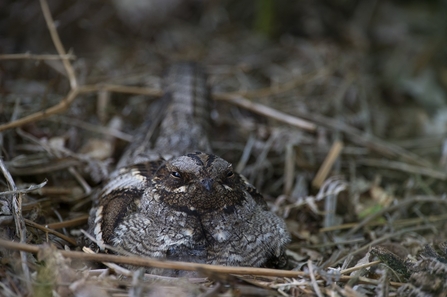
A nesting Nightjar by David Tipling 2020/Vision

A nesting Nightjar by David Tipling 2020/Vision
Allowing dogs to run wild in nature reserves can be devastating for wildlife, particularly in spring when species are breeding and vulnerable. We’re asking dog walkers to be sensitive by keeping their animals on short leads, sticking to paths, and properly disposing of dog poo. Wildlife is already under enormous pressure – let's all keep dogs in check so as not to make things worse.Jeff SimStaffordshire Wildlife Trust
|
The celebrated song of the skylark and bubbling call of curlew are evocative and welcome sounds of spring, as people explore our wonderful countryside and urban commons again. Birds like these – whose numbers are in worrying decline – are making their fragile nests on the ground, tucked away safely in long grass. However, too often, an exuberant or inquisitive pooch, wandering or bounding through grass or heather, easily disturbs wildlife and scares adult birds off nests or tramples eggs. And vulnerable chicks can quickly perish if they are left alone for too long. Staffordshire Wildlife Trust are calling on dog walkers to keep their dogs on short leads to help ground-nesting birds this spring and summer. Whether you’re visiting moorland, fields, wetlands or our urban parks, there are birds nesting on the ground – or just above it – that can be hard to see and are at risk of trampling, disturbance, and harm. Jeff Sim, Staffordshire Wildlife Trust’s Head of Species Recovery and Nature Reserves, says: “Allowing dogs to run wild in nature reserves can be devastating for wildlife, particularly in spring when species are breeding and vulnerable. We’re asking dog walkers to be sensitive by keeping their animals on short leads, sticking to paths, and properly disposing of dog poo. Wildlife is already under enormous pressure – let's all keep dogs in check so as not to make things worse.” James Brittain-McVey, lead guitarist of The Vamps, dog owner and ambassador for The Wildlife Trusts says: “I’ve learnt, as a rescue dog owner, the importance of keeping your dog under control at all times. And at this time of year, it’s especially important to remember that we can all play our part in helping birds breed successfully by keeping dogs on short leads in wild places – especially when so many species are having such a hard time.” |

Willow warbler by Ben Hall 2020/Vision
|
Many people think of birds’ nests as being high up in trees, but a surprising number nest on the ground or just above it, in low bushes. For example:
If you’re headed to the beach for an Easter break it’s important to take care around the coastline too. Oystercatcher, ringed plover and little tern eggs and chicks are brilliantly camouflaged on beaches among pebbles and sand, making them easy to disturb. Some beaches have cordoned-off areas to protect some of the rarest birds’ nests – but it’s best to keep dogs on leads on all beaches and the wider countryside until chicks have fledged in September. Keeping dogs on short leads will benefit other wildlife that can be harmed or disturbed by enthusiastic canines – from snakes to amphibians and mammals. The law says that you must keep your dog on a lead no longer than two metres between 1st March and 31st July, when on any open access land to protect ground-nesting birds. For safety, you should also always keep your dog a lead around grazing animals, although it’s safer to let your dog off if you are chased by cows or horses. Other benefits of keeping dogs on leads include:
While Staffordshire Wildlife Trust allows dogs on leads at all our reserves, it’s always worth a look at individual nature reserve webpages before you leave home to see if the site you plan to visit is the right choice for a walk with your dog. |